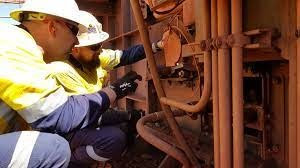Knowing the when and how of maintenance for your company's conveyor rollers guarantees its ability to work long-haul shifts. Regular maintenance saves time, cash, and energy. We take a quick look at the best approaches to conveyor rollers maintenance.
GUIDE TO MAINTAINING CONVEYOR
ROLLERS
It’s imperative to understand
that different conveyor rollers will show signs of wear and tear and demand
maintenance over time. Plastic rollers, gravity rollers, rubber rollers, steel,
and stainless-steel rollers all have maintenance needs.
Here are some rules to follow
that will keep your conveyor rollers properly maintained:
CONVEYOR MAINTENANCE STEPS
1. Regular lubrication of the
pressure or drive screw and nut with oil. After extensive use, these parts
should be sealed with oil.
2. After using the conveyor system,
oil the roller bearings and drive chain, routinely. It’s best practice to
ensure that the concerned factory worker oils these parts of the roller, i.e.
someone is always there to monitor the maintenance or oiling needs of the
system.
HOW TO CLEAN A CONVEYOR?
The proper cleaning of conveyor
rollers will ensure the long and useful life of the conveyor rollers. It
is made from different kinds of materials depending upon the type of product it
is used for.
Here are the list of mistakes to
be avoided while cleaning the conveyor rollers:
1. Clean your conveyor rollers
regularly. Wipe down any debris or residue from its surface to keep it clean
and hygienic, as well as to avoid any blockages in the systems. Every roller
has specific steps of cleaning them, for example, stainless-steel rollers
should be sprayed with water and washed using a detergent. While in the case of
dry materials gathered over the belt, rotating bristles or vane brushes should
be used, fairly four to five times higher than the belt speed. However, no
training is required in order to clean rubber discs in spiral-type return
rolls.
2. One thing that needs to be kept
in mind before cleaning the conveyor rollers is that the chemical products
being used do not affect the composition or structure of the rollers.
3. When a high number of surfaces
are used with rollers, more careful and thorough cleaning is required.
Just as maintenance fixes an issue, precautionary maintenance is additionally fundamental for conveyor systems possessors. This is a type of deterrent maintenance pointed toward discovering little issues before they grow into a major issue. It additionally ensures that your working environment is running viably.
PREVENTATIVE CONVEYOR MAINTENANCE
1. Examine how the conveyor rollers are running and
check in case they're adaptable, the surface is level, and if the drive chain
or belt is worn.
2. Monitor how the rollers are continuing on the
conveyor, they should all be moving along as planned and similarly. In case one
is wobbling or not moving, that is an issue that should be checked out
immediately. Actually, take a look at the roller direction and check whether
you can fix the issue securely, or else contact a maintenance expert.
3. Check the temperature of the greased-up part of
the roller bearings in case the system has been running for too long. In case
the system is exceptionally hot, turn it off, and wait for it to cool, and then
check for any expected issues.
Timely maintenance is an
appropriate way to outspread the life of a conveyor roller system. However,
after extensive usage, conveyor rollers or parts will need replacing.
With advancements in industrial
technology, increasingly more roller conveyors are being demanded. In light of
their straightforward design and advantageous use, roller conveyors are
generally used across a variety of applications.
The following seven methods will
help you in maintaining and lubricating conveyor rollers:
1. The
temperature of the roller bearings and shaft has to be maintained at an
acceptable limit and to ensure the same, keep a regular check on the
temperature of the roller bearing’s component.
2. Observe
the movements of roller conveyors, stability of goods at the crotch area, the
accuracy of products and transfer operations, and working of each cylinder.
3. Check the neutrons do not collide and
strike in the goods, besides the roller bearings are not disrupted.
4. Use
oil to lubricate the drive screw and nut, time and time again. Regularly used
drive screws and nuts are sealed with oil.
5. Clean
the residues, layered around the surface of conveyor rollers, daily.
6. After
using conveyor rollers, make sure to oil the bearings and drive chain,
regularly. Machine operators must inspect oil leakage and irregular changes on
lubrication points and identify the problem early.
7. Check
whether the conveyor roller is running smoothly, drive rollers connected to the
drive are trustable, buttons and indicators of automatically running devices
work normally.






ReplyDeleteHello, if you are looking for,Bulk Material Handling – Portrucks visit our website now.